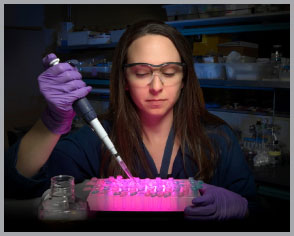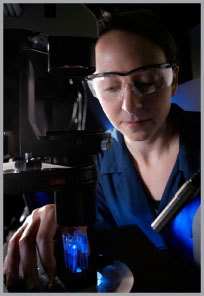
Amy E. Herr
BioengineeringAmy E. Herr received her B. S. degree from Caltech and her M.S. and Ph.D. degrees from Stanford in Mechanical Engineering. From 2002-2007, Dr. Herr was a Biosystems Research staff member at Sandia National Laboratories (Livermore). At UC Berkeley since 2007, Professor Herr’s research focuses on instrumentation innovation to advance quantitation in life sciences and clinical problems – impact spans from tools for fundamental research (cell signaling) to near-patient disease diagnostics. Two entrepreneurial ventures have spun out of her research group and have successfully secured seed round funding and are now pursuing product development in University of California incubator facilities.
Spark Award Project
Getting Personal: Massively Multiplexed Microanalytical Tools for Linking Proteomics to the Drug Development Pipeline
Personalized medicine is imaginable, but not truly realized. Historically, drug discovery efforts have sought the “blockbuster” drug. Nevertheless, mounting evidence suggests that individual response to treatment is anything but ‘one-size-fits-all’. A personalized approach to medicine has benefitted from understanding the individual’s genetic make-up (e.g., breast cancer). Genomics technology has played a key role in yielding a treasure trove of information unimaginable just five years ago. That said, important individual information is carried at the protein level (i.e., Alzheimer’s disease, prostate cancer) and our protein measurement capabilities are severely lacking. Slow, labor-intensive, qualitative readouts are the norm. To bridge this gap, we propose to radically advance the content and fidelity of protein-level measurements by introducing uniquely-suited multiplexed proteomic technology built on a microsystems/nanomaterials framework. Our approach would yield proteomic data suitable for fusion with genetic information, underpinning truly individual medicine. Patient costs, insurer costs, and pharmaceutical costs would all potentially benefit.
Amy Herr’s Story
Beyond Genomics – Mining the Proteome
By: Wallace Ravven
April 1, 2013
After age 60, a man faces one chance in six of getting prostate cancer. Unfortunately, the lab test that detects the disease can’t reveal if the cancer poses a real risk. It looks for elevated levels of a protein called PSA. But about 80 percent of cancers that generate high PSA levels grow so slowly that they may never need treatment.
Not knowing if their prostate cancer is likely to metastasize, millions of men undergo often-painful biopsies, and surgeries that can cause serious complications – only to learn that their cancer was not a likely threat.
New research now points the way to a much more refined assessment of proteins and the promise of better diagnosis and treatment of a range of diseases. After proteins have been faithfully produced from our cells’ genetic blueprints, they can naturally undergo chemical changes that dramatically alter their behavior. The alterations, known as post-translational changes, are not coded in our genes, but some of them may be linked to aggressive types of cancer, and to other serious disorders.

Photo: Sandia National Lab
In theory, a simple assay – an assessment of an individual’s protein make-up – could improve
diagnosis and treatment of conditions caused by protein variations. In the case of prostate cancer, most men would then be able to breathe easy, and only those at risk could get the treatment they need.
The hitch is that researchers lack a key tool to move these new insights into practical use. They need a fast, efficient way to sort through and identify the modifications, or isoforms, of a single suspect protein. By isolating the different versions of a single protein, scientists have a shot at determining which modifications are linked to disease.
“We need to learn, not only what is encoded in the genome – the blueprint of life – but how that actually translates into protein function in health and disease,” says Amy Herr, associate professor of bioengineering at Berkeley.
Herr is on the front lines of proteomics research – the ambitious effort to determine the variety and function of all human proteins. Her research, supported by the Bakar Fellows Program, which funds innovative research by early career faculty at UC Berkeley with a special focus on projects that hold commercial promise, focuses on developing a more quantitative strategy to assay changes in proteins. This strategy could launch a new generation of diagnostics based on a precise understanding of proteins’ roles in both normal and diseased tissue.
Herr’s lab is developing a way to assay many dozens of human proteins at a time. The technology is designed to assay proteins in extraordinarily small volumes of liquid. This “microfluidic” approach introduces minute samples onto chips similar to those used in the semiconductor industry, except that these chips are designed with microchannels that can each route individual specimens for protein analysis.

The new microfluidic approach allows fast, efficient and automated analysis for the first time – with dozens of individual proteins simultaneously teased apart into their different forms.
The bounty of new biological information can be digitized and archived, Herr explains, allowing findings to be integrated with insights at the genomics level. The strategy provides a new window on potential protein targets for diagnostics and treatments.
And because it employs materials common to industry, the assay strategy can be integrated with existing technology. In a word, it will be “manufacturable.”
Misbehaving proteins may underlie many diseases, so high-volume, automated assays could be a boon to diagnosis and potential treatment well beyond prostate cancer. Variation of individual proteins may play a role in the malformation of proteins in diseases such as Alzheimer’s and Parkinson’s.
Herr’s lab has already begun partnering with major pharmaceutical
companies interested in applying rapid and refined, industrial-scale microfluidic assays. Efficient assay techniques can greatly speed – and reduce the costs of – testing new compounds for their ability to boost or block protein variations that promote devastating diseases.
“Our current understanding of how changes in a given protein affect health and disease has been mostly a black box,” Herr says.
Her lab is showing the way to pry open the box.